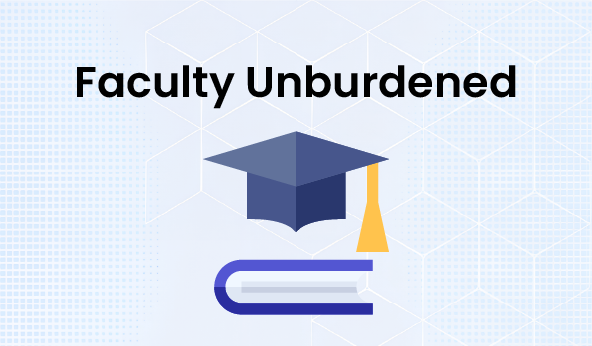How faculty’s role can be made easier and smoother in accreditation preparation
General
Simplifying Faculty’s Role in Accreditation Preparation
Academic accreditation is a formal recognition of an educational program or Institution per the standards of quality set by the accreditation agency against well-defined criteria. Collegiate accreditation is granted to particular higher educational Institutions based on an impartial assessment of the attainment of specific requirements in terms of its performance, related to the academic processes and outcomes, covering the entire academics, administration, and services.
However, accreditation might stress faculty administratively. According to studies, professors spend 30%-40% of their semester workload on accrediting documents, with over 70% saying it takes time away from teaching. Meeting accreditation standards is easier with good Accreditation Management Software.
This blog discusses how Accreditation Management Software simplifies data gathering and reporting for professors. Explore how these tools help teachers focus on teaching rather than paperwork.
Role of Faculty in Accreditation

Many faculty members have to spend a huge part of their teaching loads in gathering data for accreditation. Collecting historical data is an uphill task. The overall process is very time-consuming and hence explains why course and institutional accreditation pose problems for colleges and universities.
Challenges Faculty Face in the Accreditation Process

Faculty frequently navigate the dual responsibilities of accrediting duties with their principal functions in instruction and mentorship. Here are three common problems they often face:
- Professors devote 30–40% of their class time each semester to writing accrediting paperwork, which is a substantial time commitment.
- Accreditation measures take a long time to develop and assess because of the high manual workload involved in data collection and evaluation, which is both complex and prone to mistakes.
- When processes are done by hand, it's hard to find and fix any gaps in accreditation paperwork, which can lead to submissions that aren't full.
Addressing Accreditation Standards with Accreditation Management Systems
Using Accreditation Management Software can simplify data collecting and reduce faculty burden, streamlining the road to accreditation. Accreditation with organizations such as ABET, NBA, TEQSA, and others can be prepared more efficiently, with less confusion, and in less time. Important aspects consist of:
- Faculty no longer need to spend hours gathering data because they have on-demand access to all the information they need for various reports.
- The software maintains accuracy and avoids errors using digital assessments, making evaluation straightforward and minimizing time on the job. Automated reporting is also available.
- It schedules site visits, and follow-ups, and brings it to a finish.
- Prepares in reaccreditation!

Greater Faculty Participation
Accreditation Management Systems can significantly boost faculty participation by easing administrative burdens. There is a higher probability of incomplete submissions due to manual procedures making it more difficult to detect and repair incomplete accreditation papers.
Manual processes make it more difficult to detect and correct mistakes, which increases the likelihood that certification documentation may be missing or incomplete.In addition to meeting criteria, these systems address the intricacies of accreditation, which in turn creates a more sustainable and supporting role for faculty in the accrediting process.
Conclusion
Although there is room for improvement, accreditation is an essential process that may be simplified to make life easier for teachers and increase productivity. Automatic data collection, simpler reporting, and real-time tracking of accreditation metrics are all features that institutions may take advantage of using Creatrix Campus Accreditation Management Software. Instructors can spend more time focusing on student achievement and less time on administrative tasks with this effective tool. Institutions can better meet accreditation criteria and give teachers a greater say in determining student achievement by using Creatrix Campus. Contact team Creatrix now!
Want to contribute?
We welcome thought leaders to share ideas and write for our blog.
Become a Guest Author →
